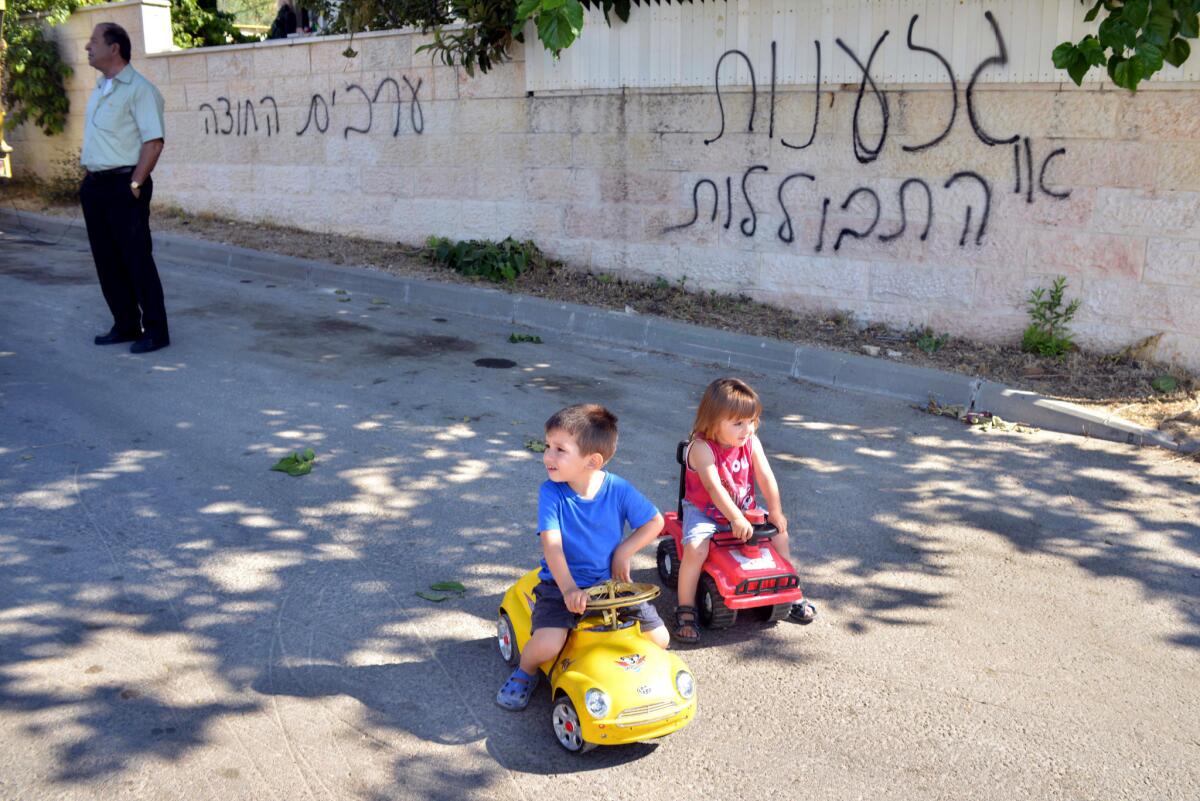Arab village latest target of political vandalism in Israel

ABU GHOSH, Israel -- Dozens of residents of this Arab village near Jerusalem woke up Tuesday to find their tires slashed and their walls spray-painted with hateful messages, their community the latest target of a series of politically motivated vandalism in Israel.
The late-night attack surprised residents of Abu Ghosh, known for its warm, neighborly relations with Jewish communities west of Jerusalem.
“Not in our worst dreams did we imagine this happening here,” said city official Issa Jaber. “Abu Ghosh has been an exemplary model of Arab-Jewish coexistence for decades.”
President Shimon Peres spoke with the village mayor, Salim Jaber, and condemned the attack as “racist behavior which crosses a red line.” Prime Minister Benjamin Netanyahu promised action, saying the incident “contravenes the values of our people and state.”
The Israeli government is beginning to crack down on such attacks, dubbed “price-tag operations” by the perpetrators and believed to be carried out by Jewish extremists seeking to exact a price for government action against Jewish settlements.
The attacks were initially directed against Palestinians in the West Bank, but crossed the Green Line in recent years. Targets have included mosques, monasteries and Jewish and Arab peace activists.
Ami Ayalon, a researcher with the Israel Democracy Institute and former chief of the Israeli domestic intelligence agency Shin Bet, argues the attacks must now be recognized as “a concrete and imminent danger to our life in a democratic society.”
Shortly after taking office, Justice Minister Tzipi Livni made the issue a high priority, coordinating efforts with Netanyahu, Public Security Minister Yitzhak Aharonowitz and Israeli security branches, including Shin Bet.
On Sunday, the security Cabinet authorized the defense minister to declare the perpetrators of such attacks an “illegal association,” a designation that gives the security forces stronger investigative and judicial tools.
The decision stopped short of a proposal to designate the attacks acts of terrorism, to which Netanyahu reportedly objected, reluctant to compare vandalism with the kind of deadly attacks conducted by groups such as Hamas, according to leaks from the closed-door discussions.
Aharonowitz, who supported the designation, warned the attacks could destabilize security in the West Bank and Jerusalem and called them an “an act of terror like any other.”
Responding to the latest incident, opposition leader Shelly Yachimovich called the vandalism “pure hate crimes” and said it was “inconceivable that Israel’s famed security branches can’t put their hands on this lawless group.”
Lawmaker Yisrael Hasson, a former deputy chief of Shin Bet, Israel’s domestic security agency, told Israeli media that authorities have intelligence on the perpetrators but are often out-maneuvered by “young ideologues” employing shrewd legal tactics, such as refusing to answer police questions.
“They’re masters at covering up evidence,” he said.
Throughout the day Tuesday, members of neighboring Jewish communities called leaders and friends in Abu Ghosh to offer their support. Activists were planning to hold a solidarity rally.
Israel’s intelligence minister, Yuval Steinitz, who lives up the road from Abu Ghosh, said he was outraged by the attack on his neighbors. Asked if the perpetrators should be put on the list of terrorist groups, Steinitz said, “It doesn’t matter where they’re put as long as they’re put on trial and in jail.”
Economy Minister Naftali Bennett issued a statement calling the attacks immoral and un-Jewish.
But some here point the finger at him, noting a speech he gave Monday rejecting the idea of a Palestinian state and using language that residents considered inflammatory.
“This is the direct result of such talk,” village resident Khatem Ibrahim said, contemplating the Hebrew graffiti splashed across a wall near his house reading “Arabs out.”
At the gas station up the road, tire repairman Mohammed Issawi had his hands full. Nodding at a stack of slashed tires brought in from Abu Ghosh, he said, “The police don’t take this seriously and one day this will end very badly. God forbid someone gets killed. They’ll wake up then for sure.”
Mayor Jaber expressed confidence that the community was stronger than one small group “that seeks to destroy good relations.”
ALSO:
U.S. says Taliban agrees to Afghanistan peace talks
Presidents Obama and Putin share icy encounter over Syria
Suicide bomb blast kills more than 20 in northwest Pakistan
Sobelman is a news assistant in The Times’ Jerusalem bureau.
More to Read
Sign up for Essential California
The most important California stories and recommendations in your inbox every morning.
You may occasionally receive promotional content from the Los Angeles Times.










